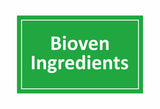Bioven Ingredients Bacterial Xylanase Enzyme Powder-125gm
Rs. 1,525.00


Cas No: 9025-57-4
Enzyme Activity: 50000 U/gm
Form: Powder
For non-ruminant animals, xylan is an indigestible substance that increases the viscosity of chyme and inhibits the absorption of protein and energy, hence having a major antinutritional effect. Feed cost reductions can be minimized and xylan anti-nutrition eliminated by using xylanase in diets.Bacterial xylanase is an enzyme that functions in the breakdown and degradation of complex plant polysaccharides known as xylans. Xylans are a major component of plant cell walls and are composed of xylose units linked together. The primary role of bacterial xylanase is to cleave the glycosidic bonds between these xylose units, ultimately converting xylans into simpler sugars, such as xylose.
Functions:
- Its functions include breaking down the structure of cell walls, particularly xylan, lowering the viscosity of chyme in the digestive tract, and enhancing the efficiency of nutrient digestion.
- Enhance feed quality, lower feed costs, and maximize energy usage.
- Increase gut health, boost animal performance, and produce a lot of xylo-oligosaccharides.
Applications:
-
Animal feed: Xylanase supplementation in animal feed can improve the nutrient availability and digestibility of plant-based feedstuffs, leading to enhanced growth performance, feed efficiency, and reduced environmental impact due to lower excretion of undigested feed components.
-
Food industry: Xylanase is used in the production of various food products, such as bread, pasta, and breakfast cereals, to improve dough handling properties, increase volume, and enhance texture. It also finds applications in the production of low-calorie and gluten-free foods.
-
Biofuel production: Xylanase plays a significant role in the production of bioethanol from lignocellulosic biomass by breaking down hemicellulose, which contributes to the release of fermentable sugars for further conversion into biofuels.
-
Textile industry: Xylanase is employed in the textile industry for the biopolishing and desizing of fabrics, where it helps to remove size materials and improve fabric properties.






